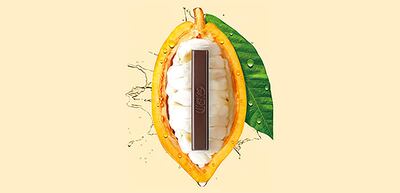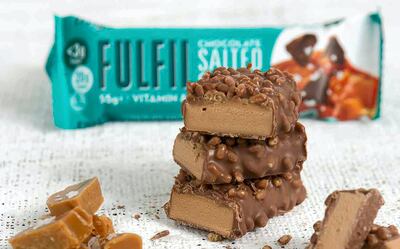Chocoholics, rejoice. Willy Wonka and his non-fictitious peers are starting to sit up and pay attention to consumer patterns that indicate many of us are now making healthier, more discerning choices when shopping for food to snack on. Obesity rates are on the rise among adults and children, while numerous studies link sugar to a host of evils, including weight gain, acne, insomnia, diabetes and heart disease.
Well-being is the word on everyone’s lips, which is why some large confectionery corporations are beginning to offer smarter options, no doubt in the hope that their products are the ones we will turn to when looking for a guilt-free indulgence.
Here's how Guylian, Cadbury, Nestle and Hershey's plan to make chocolate healthy, with UAE nutrition coach Fran Ellis's giving her opinion on whether they will actually succeed.
Portion control
Premium Belgian chocolate brand Guylian (of the deliciously creamy two-tone shell-shaped chocolates fame) has reduced the number of bars in a packet to do its bit in curbing obesity levels. "The younger generations are more deliberate in choosing what they eat. For snacking or treats, they like to enjoy smaller amounts of higher quality products. Today we see that twice as many consumers prefer individually wrapped chocolate bars over a [slab] of chocolate," says marketing director Pieter De Pauw.
According to Guylian, recent consumer research indicates that one out of three consumers attaches importance to portion control, so it is this need that the brand is tapping into to innovate the way people consume its offerings, which are now available in smaller 25-gram mini bars in six flavours.
Does it work? Nutritionist Ellis says: "I think offering a smaller portion size is a great idea; often people are presented with portions that they don't need or want, but no one is going to throw away the last bite of a delicious chocolate bar. It's all about changing the environment, so if you have a chocolate bar that is just as satisfying but 25 per cent smaller, I think most people won't notice." Potion control is also in line with current trends of mindful behavior and intuitive eating, and reducing portions can pave the way for changing your entire diet for the better.
Calorie control
Mondelez International-owned Cadbury is making changes to its famous purple-wrapped Dairy Milk, with a health-food approach known to yo-yo dieters everywhere. The new bar cuts calories down to 100 by minimising size and sugar content by 30 per cent. Other products by the brand such as Fudge, Curly Wurly, Chop, Mini Fingers and Animals are all getting a calorie chop to 100, too. They will be available in the UK and Ireland to begin with.
Does it work? Ellis says: "It is a nice gesture, but I don't think it makes a huge difference if you're still consuming products with refined sugar. Having said that, following a balanced and healthy routine is all about progress and not perfection, so if cutting 50 or 100 calories of processed food out of your snack is progress in your quest for a healthier life, then great."
Sugar control
In line with almost every health food retailer in recent years, Nestle is training its sights upon sugar as the main culprit for obesity, which should be omitted to provide customers with better snacking options. The company has taken all trace of refined sugar out of a new bar it promises is a “single source” dark chocolate. The sugars will come from the cocoa plant and sourced directly from the cocoa fruit’s pulp.
Does it work? Ellis says: "Raw cacao actually has many excellent qualities: it is high in magnesium which can curb your sugar cravings, and high in fibre, and contains iron and protein as well as antioxidants. If you are eating a chocolate bar full of sugar, it could make you crave more sugar.
“In terms of products available from mainstream supermarket shelves, my advice would be, if you really want chocolate – a Mars bar, say - then eat it. They key is to not ram it in as if it is the last chocolate bar on the planet. Tune into your craving, enjoy every bite, savour it, eat it slowly. By eating in this way you are far more likely to satisfy your cravings for sugar as you are giving your brain and body a chance to realise you have consumed it.”
Ingredient control
Transforming what future generations might define as chocolate, the likes of Hersheys and Norty Nutrition are investing in new, guilt-free, “good for you” bars, featuring supplements such as protein and macrobiotics. Hershey has invested in Irish protein snacks group Fulfil, while Australian brand Norty Nutrition has developed a snack bar to diversify the human microbiome (the good bacteria that make up our gut environment) with pre and probiotics.
Does it work? Ellis says: "On the whole, the more minimally processed whole foods we eat the better, and that includes all types of processed chocolate bars. I can see that these will be low in sugar, but they do use sweeteners and E numbers [food additives]. There is no magic formula to these bars, and you are always better off with whole foods."
She advises you make your own healthy version instead. "In terms of chocolate that is better for you, I often advise clients to make super-quick cacao date balls to curb cravings. Simply whizz one cup of dates, one cup of oats, a quarter cup of cacao power and a big spoon of coconut oil in the blender and roll into balls."
Taking shortcuts, then, may not be the solution when it comes to our chocolate consumption habits. "Focusing on just one food is a very reductionist approach to diet. Chocolate can 100 per cent be part of a healthy diet – even processed chocolate with sugar in it. What we must do if we make the decision to eat it, is to own it."



